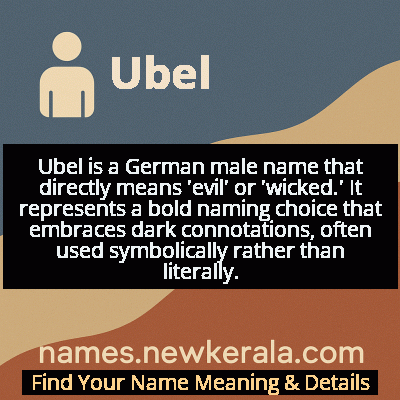Ubel Name Meaning & Details
Origin, Popularity, Numerology Analysis & Name Meaning of Ubel
Discover the origin, meaning, and cultural significance of the name UBEL. Delve into its historical roots and explore the lasting impact it has had on communities and traditions.
Name
Ubel
Gender
Male
Origin
German
Lucky Number
4
Meaning of the Name - Ubel
Ubel is a German male name that directly means 'evil' or 'wicked.' It represents a bold naming choice that embraces dark connotations, often used symbolically rather than literally.
Ubel - Complete Numerology Analysis
Your Numerology Number
Based on Pythagorean Numerology System
Ruling Planet
Uranus (Rahu)
Positive Nature
Strong sense of order, loyal, practical, and disciplined.
Negative Traits
Stubborn, overly serious, rigid, and prone to feeling restricted.
Lucky Colours
Blue, gray.
Lucky Days
Saturday.
Lucky Stones
Blue sapphire.
Harmony Numbers
1, 7, 8.
Best Suited Professions
Managers, engineers, accountants, organizers.
What People Like About You
Dependability, discipline, practicality.
Famous People Named Ubel
Ubel Blatt
Fictional Character
Protagonist of the dark fantasy manga series known for his complex morality and tragic backstory
Ubel Nacht
Fictional Character
Antagonist in the manga series 'Soul Eater' known for his madness wavelength and chaotic nature
Ubel von Götzen
Historical Figure
Minor German noble known for his controversial land management practices and local folklore
Name Variations & International Equivalents
Click on blue names to explore their detailed meanings. Gray names with will be available soon.
Cultural & Historical Significance
In later centuries, the name became associated with Gothic literature and Romantic era works where characters named Ubel often represented the 'noble villain' archetype—complex antagonists with tragic depth. The name also appears in German folklore as a surname for characters who served as moral foils or represented the consequences of wicked choices. During the 19th century, the name saw some usage among intellectual circles interested in exploring philosophical concepts of good and evil, though it never achieved widespread popularity.
Extended Personality Analysis
Individuals named Ubel are often perceived as intense, complex personalities with strong wills and deep emotional currents. They tend to be highly independent thinkers who challenge conventional norms and are unafraid to explore the darker aspects of human nature. This name often attracts people who are introspective, philosophical, and drawn to understanding the complexities of morality and human behavior. While they may appear reserved or mysterious to outsiders, those named Ubel typically possess sharp intellects and creative problem-solving abilities.
Their association with the name's meaning can sometimes lead them to develop a unique perspective on good and evil, often seeing moral issues in shades of gray rather than black and white. Many develop a strong sense of justice and may become passionate advocates for misunderstood causes or marginalized groups. The name's inherent intensity often manifests as determination and resilience in the face of adversity, though it can also lead to periods of introspection and solitude. Those named Ubel frequently demonstrate artistic or creative talents, particularly in fields that explore human psychology or dark themes.
Modern Usage & Popularity
In contemporary times, Ubel remains an extremely rare given name, primarily used in Germany and German-speaking communities by parents seeking distinctive, edgy names with Gothic or literary appeal. Its usage has seen a slight increase in the 21st century, particularly among alternative subcultures and families with interests in dark fantasy or philosophical naming traditions. The name is more commonly encountered in fiction than in real life, appearing in manga, video games, and fantasy literature where creators use its inherent meaning to establish character traits. Modern parents who choose this name often appreciate its uniqueness and the opportunity to reclaim a traditionally negative term, viewing it as a statement about complexity and depth rather than literal evil. Despite this minor resurgence, the name remains outside the top 1000 names in any German-speaking country and is considered highly unconventional.
Symbolic & Spiritual Meanings
Symbolically, Ubel represents the concept of embracing and understanding darkness as an essential part of human experience. It serves as a reminder that what society labels as 'evil' often contains complexity, nuance, and valuable lessons. The name symbolizes the philosophical exploration of morality, the shadow self in Jungian psychology, and the idea that confronting darkness can lead to greater wisdom and strength. In literary contexts, Ubel often represents the anti-hero archetype—characters who operate outside conventional morality but may ultimately serve greater purposes. The name also symbolizes transformation, as it suggests the potential for negative qualities to be channeled into positive outcomes, much like alchemical processes that transform base metals into gold. This symbolic meaning extends to personal growth through adversity and the integration of one's darker aspects to achieve wholeness.

